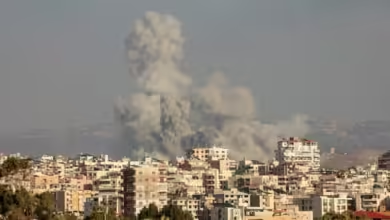Iran’s Election Interference & Israel’s Escalation: Global Impacts and Responses

Iran Sent Stolen Trump Campaign Info to Biden Staffers: Report
The U.S. is facing yet another instance of foreign interference in its electoral process, this time with Iran allegedly sending stolen Trump campaign information to Biden staffers during the 2020 election, as per recent reports. This situation underscores the growing global threats to democracy and election integrity, with significant international ramifications.
Israeli Warplanes Strike Southern Lebanon After Declaring New Phase in the War
In a sharp escalation, Israeli warplanes targeted a weapons storage facility in southern Lebanon. This action comes after Israel declared a new phase in its ongoing war with Hezbollah. According to reports from Israeli defense forces, this was a retaliatory strike against Hezbollah, who earlier attacked Israeli positions. The Israeli Defense Minister confirmed the operation was part of an extended military campaign aimed at neutralizing Hezbollah’s capabilities.
The airstrike led to significant damage in Lebanon, with the destruction of several key infrastructures, including electronics and solar equipment. Local reports indicate that 21 individuals were killed, and over 300 were injured in the bombardment. This marks one of the most intense phases of the conflict.
Hezbollah Pagers Explode: 12 Dead, 2700+ Injured in Lebanon Attack
Hezbollah Threatens Retaliation After Israeli Strikes
Following the airstrike, Hezbollah’s leadership issued a stern warning to Israel, promising severe punishment. Sheikh Naim Qassem, the head of Hezbollah’s Executive Council, stated that Israel’s offensive would not go unanswered. “Israel is in for special punishment,” he declared, signaling that the conflict could intensify further in the coming days.
Israeli forces have reported multiple projectiles fired from Hezbollah-controlled areas into Israeli territory, causing minor injuries but no major fatalities. The Israeli government remains on high alert, with Prime Minister Benjamin Netanyahu announcing that this phase of the war may take weeks to months to resolve.
Mossad’s Covert Operations and the Role of Cyber Warfare
A key component of Israel’s recent offensive appears to be its advanced cyber warfare capabilities. The explosion of Hezbollah’s communication devices, including pagers and walkie-talkies, has raised questions about Mossad’s role in sabotaging Hezbollah’s operations. Sources indicate that Israeli intelligence may have infiltrated Hezbollah’s supply chains months, if not years, in advance, planting devices to create chaos and mistrust within Hezbollah’s ranks.
This “kinetic cyber operation,” as defense experts call it, showcases the evolving nature of modern warfare, where digital interference is as destructive as physical attacks. By disrupting Hezbollah’s communications, Israel hopes to paralyze their offensive capabilities and gain an upper hand in the conflict.
Global Implications of Iran’s Election Interference
Amidst the Middle East conflict, new reports have surfaced regarding Iran’s alleged interference in the 2020 U.S. Presidential election. According to the FBI, Iranian hackers sent unsolicited emails containing stolen Trump campaign data to members of the Biden campaign. However, Biden’s team reportedly did not open these emails or engage with them. While there is no evidence to suggest that Iran’s actions had any direct influence on the Biden campaign, the situation highlights a worrying trend of foreign adversaries trying to meddle in U.S. elections.
Iran’s motivations for this interference remain unclear, though experts suggest they may have been attempting to sow discord within the U.S. political landscape, rather than directly supporting any particular candidate. Cybersecurity analysts have noted a growing trend of foreign actors, particularly Russia, China, North Korea, and Iran, attempting to disrupt democratic processes worldwide.
India Rejects U.S. Plea to Sanction Russian Media, Affirming Its Independent Stance
The Axis of Tyranny: Russia, China, and Iran
The 2020 election interference is just one part of a broader geopolitical strategy by authoritarian regimes like Russia, China, and Iran to undermine Western democracies. These countries view the democratic process as a threat to their regimes, and by interfering in elections, they aim to destabilize the global order.
Former CIA station chief Dan Hoffman recently commented on the significance of this axis of tyranny: “They want Americans not to trust their own democracy. Russia, China, North Korea, and Iran are fighting against democracy because it scares them.” His remarks reflect a broader consensus among intelligence experts that election security remains one of the most significant challenges facing democracies today.
A Call for Bipartisan Action
As foreign interference in elections continues to pose a threat, it is vital for both political parties in the U.S. to unite in their efforts to safeguard democratic processes. The growing threats from foreign adversaries should be seen as a national security issue, transcending party lines.
In this context, it is crucial for political leaders to focus on policy differences while working together to combat the common enemy of foreign election interference. As Dan Hoffman pointed out, “The best thing for both parties is to come together and agree this should not be happening.”
Conclusion
The dual threats of escalating violence in the Middle East and election interference from foreign adversaries underscore the challenges faced by democratic nations today. As the situation in Lebanon continues to unfold, the international community must remain vigilant in ensuring election integrity and preventing foreign powers from undermining democracy.
The road ahead is uncertain, but one thing is clear: cooperation and a unified approach are essential to countering these evolving threats.





